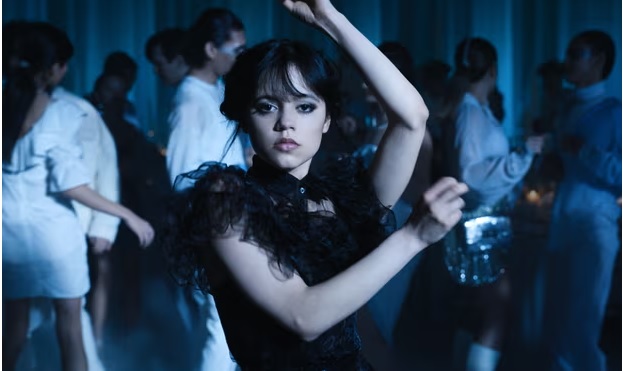Tim Burton’s Addams Family reboot series has become only the third Netflix show to rack up a billion hours of views in a month, inspiring TikTokers and Lady Gaga along the way

It’s official: Wednesday, the Netflix Addams Family reboot directed in part by Tim Burton, is a smash hit. Just three weeks after its release, the young adult series has racked up a staggering billion hours’ worth of views, a Netflix benchmark surpassed only by Squid Game and Stranger Things 4.
Consequently, social media feeds have also been clogged by fans (Lady Gaga included) in their best Wednesday Addams cosplay. The children of TikTok have been diligently recreating her Siouxsie and the Banshees-inspired performance, in which star Jenna Ortega’s now-viral choreography to the Cramps’ 1981 cover of Goo Goo Muck may have single-handedly revived Gothic subculture for Gen Z (the series also picked up two major Golden Globe nominations this week).
Given the incalculable hours fans have spent analyzing Wednesday’s outfits, dance moves and lip color (a dark berry liner diluted with clear gloss, according to a few beauty influencers), entertainment execs everywhere are asking themselves: what’s the magic formula that propels such viral popularity? Following Netflix’s dismal year of plummeting stock value and lost subscribers, Wednesday arrives as a mixed bag of surefire storylines with a little something for everyone. This is a supernatural, coming-of-age, murder-mystery young adult comedy, where Ortega, officially the It Girl of the moment, plays the daughter of a familiar and beloved TV family. Wednesday is both the underdog misfit and the hottest girl in school, the product of the unlikeliest of mergers: think Addams Family meets Emily in Paris, sprinkled with a heavy dose of Harry Potter.
In the first episode, we see our titular protagonist’s expulsion from her normie suburban high school, after unleashing a few bags of piranhas on the high school water polo team. It’s retribution for her little brother’s bullying, she makes sure to let them know. “No one tortures my brother but me.” With a ready arsenal of barbed quips and erudite comebacks, Wednesday transfers to Nevermore Academy, a remote boarding school for marginalized fangs, furs, stoners and scales. She’s the perfect student – a gifted polyglot, cellist, novelist and fencer (all talents that contradict a public school education) – but still, she finds herself “an outcast in a school of outcasts”, a committed misanthrope who bristles at human contact.
“Sartre said hell is other people,” she tells her therapist. “He was my first crush.”
You could succinctly describe Nevermore as Hogwarts styled by the CW, and Wednesday’s narrative arc as goth Emily in Paris. Like Emily, an outsider at a new job, Wednesday’s an outsider at a new school, likewise cast as an eccentrically dressed social pariah despite being gorgeous and excelling at every little thing. Where Emily falls into a love triangle involving a local chef, Wednesday finds one with a local barista; through crushes, peer rivalries and social faux pas, both brunettes ultimately come through in the end to save the day.
The important distinction between the two is an inversion of character, where relentlessly cheerful Emily is the bane of her boss Sylvie’s cool, detached existence in the same way chipper werewolf roommate Enid Sinclair (Emma Myers) is the bane of Wednesday’s.
When Emily in Paris debuted in 2020, Emily was kind of the bane of everyone’s existence. Ostensibly an adult, affluent version of Lizzie Maguire, the show was met with an obsessive wave of think pieces describing critics’ hatred in great detail. I don’t believe anyone hated Emily as much as they said they did – after all, it ended the year as Netflix’s second-most popular comedy – but they were irritated at having derived any joy from watching it. Emily’s whiteness, coupled with an unrelenting optimism and constant pursuit of her colleague’s approval, amounted to a basic, conventional idea of perfection that was embarrassing at best, completely alienating at worst.
If Emily in Paris is kind but not cool, Wednesday is cool but not kind in a way that’s infinitely more relatable and inclusive – after all, aren’t we all trash? In her own words, she’s stubborn, single-minded and obsessive, “all traits of great writers, yes, and serial killers”, she tells Thing, a disembodied hand excellently played by real-life magician Victor Dorobantu.

Especially for a teenager with a kid-friendly rating, Wednesday speaks with the critical self-awareness and acumen of your textbook Byronic hero, a literary archetype commonly associated with Heathcliff of Emily Brontë’s Wuthering Heights, or more recently Gossip Girl’s Chuck Bass, and even Sylvie. They’re your clever, morose, condescending types, dangerously blessed with irresistible good looks and saddled with the baggage of past trauma. (Wednesday’s trauma is the death of her pet scorpion, who was murdered when she was six; she’s since vowed to never cry again.)
As a good guy verging on villain, our protagonist spends the season coming to terms with her own toxic disregard for her friends’ feelings and willingness to manipulate their affections to her own ends. She repeatedly breaks one classmate’s heart with a cruelty that both Uncle Fester (the delightful Fred Armisen) and I find riveting. “The tension between you two. Yowza!” he says. “You could cut it with an executioner’s ax.” Online, fans discuss whether these are anti-social tendencies or coded autism, and how much Wednesday’s perfect bone structure excuses otherwise socially unacceptable behavior. “Only when a conventionally-beautiful, non-weird person performs weirdness is this palatable to ‘normal’ people,” according to one commenter, the parent of an autistic child. “Actually ‘weird’ people get bullied, sidelined, or placed outside of the zone of real friendships.”
Below the surface of this supernatural murder mystery is a solid young adult journey of learning to take responsibility – both of one’s actions and their effects on others. While saving Nevermore from puritanical destruction and connecting with an ancient Mexican ancestor, Wednesday is also tasked with the normal teen challenge of repairing the damage she’s done to her relationships. The enduring appeal of characters like this – an admittedly toxic outcast with inherently good intentions – is the desire for every weirdo to feel seen on TV. Wednesday’s formula may be flawed, but fantasy is the point; in an idealized world where your well-timed barbs and lack of interest in others’ approval made you impervious to bullies and the caretaker of your fellow misfits, who wouldn’t want to be Wednesday Addams?





